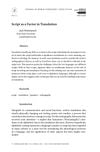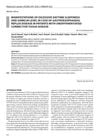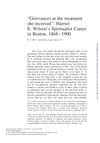 21 citations,
October 2018 in “European Journal of Pharmacology”
21 citations,
October 2018 in “European Journal of Pharmacology” Chemotherapy can cause brain inflammation and damage, and understanding this process could help manage side effects.
 2 citations,
January 2020 in “Journal of Experimental Social Psychology”
2 citations,
January 2020 in “Journal of Experimental Social Psychology” Baldness and shaved heads change how traits are seen but don't really affect leader preferences.
 February 2012 in “Expert Review of Endocrinology & Metabolism”
February 2012 in “Expert Review of Endocrinology & Metabolism” The document suggests more research is needed to understand the link between baldness and prostate cancer.
July 2002 in “Journal of cosmetic dermatology” Hair loss can be treated with medications like finasteride and surgical methods like hair transplants.
 2 citations,
January 1979 in “Yearbook of English studies”
2 citations,
January 1979 in “Yearbook of English studies” Nineteenth-century British drama closely reflected the era's societal values and concerns.
 10 citations,
June 2021 in “Primates”
10 citations,
June 2021 in “Primates” Wild geladas in crop areas show less grooming and aggression.
Non-ablative Er:YAG-laser treatment helps improve life quality for menopausal women with hair loss.
 61 citations,
February 2001 in “American Journal of Obstetrics and Gynecology”
61 citations,
February 2001 in “American Journal of Obstetrics and Gynecology” Metabolic syndrome and PCOS are related but separate conditions, with metabolic syndrome increasing the risk of heart disease and diabetes.
 1 citations,
December 2017 in “Turkderm”
1 citations,
December 2017 in “Turkderm” People with a family history of hair loss are more likely to experience it, and the severity of hair loss is linked to insulin resistance. The connection between early hair loss and oxidative stress needs more investigation.
 11 citations,
January 2001 in “Cambridge University Press eBooks”
11 citations,
January 2001 in “Cambridge University Press eBooks” Androgens can cause hair growth in some areas but hair loss on the scalp.
 2 citations,
January 2017 in “Journal of Pigmentary Disorders”
2 citations,
January 2017 in “Journal of Pigmentary Disorders” Genetics, stress, and health issues can cause early hair greying, which affects self-esteem, and there's no cure, only hair dye.
 1 citations,
January 2016 in “Journal of world literature”
1 citations,
January 2016 in “Journal of world literature” The conclusion is that the type of writing system used can significantly affect the translation of a text.
 April 2019 in “Journal of emerging technologies and innovative research”
April 2019 in “Journal of emerging technologies and innovative research” Early treatment of Female Pattern Hair Loss is important to stop it from getting worse, and various treatments can help, especially in mild to moderate cases.
9 citations,
May 2019 in “Medicine” The C-allele and CC-genotype in the PTPN22 gene lower the risk of alopecia areata.
 19 citations,
February 2018 in “Nutrients”
19 citations,
February 2018 in “Nutrients” Certain zinc transporters are essential for healthy skin and managing zinc in the body could help treat skin problems.
 1 citations,
January 2022 in “Wiadomości Lekarskie”
1 citations,
January 2022 in “Wiadomości Lekarskie” GERD symptoms are linked to acid exposure time and daytime sleepiness, influenced by ghrelin levels.

Men with hair loss are seen as less attractive and shorter, and height is a key factor in attractiveness ratings.
 November 2020 in “Psychoneuroendocrinology”
November 2020 in “Psychoneuroendocrinology” Finasteride might affect memory by impacting cholinergic system.
 December 2019 in “Buletin de psihiatrie integrativă”
December 2019 in “Buletin de psihiatrie integrativă” Skin treatments can improve both skin health and emotional well-being, but they require careful management of patient expectations and potential addiction risks.
 11 citations,
February 2019 in “Research and reports in forensic medical science”
11 citations,
February 2019 in “Research and reports in forensic medical science” DNA phenotyping helps predict physical traits from DNA with varying accuracy and requires careful ethical and legal handling.
 December 2022 in “Journal of complementary medicine & alternative healthcare”
December 2022 in “Journal of complementary medicine & alternative healthcare” Traditional Chinese medicine improved hair loss in a teenager with alopecia.
 4 citations,
September 2021 in “Frontiers in allergy”
4 citations,
September 2021 in “Frontiers in allergy” The conclusion is that understanding the complex relationship between allergies, autoimmunity, and psychological factors is key to treating skin disorders with itching.
 8 citations,
July 2012 in “Cambridge University Press eBooks”
8 citations,
July 2012 in “Cambridge University Press eBooks” Androgens can both increase body hair and cause scalp hair loss.
 39 citations,
March 2003 in “The Veterinary clinics of North America. Small animal practice/Veterinary clinics of North America. Small animal practice”
39 citations,
March 2003 in “The Veterinary clinics of North America. Small animal practice/Veterinary clinics of North America. Small animal practice” Behavioral dermatology treats skin problems by considering both emotional and physical factors.
 1 citations,
April 2012 in “American Literary History”
1 citations,
April 2012 in “American Literary History” Harriet E. Wilson had a challenging career as a spiritualist in Boston, facing competition and possible racism.
 1 citations,
February 2024 in “Philosophy, ethics, and humanities in medicine”
1 citations,
February 2024 in “Philosophy, ethics, and humanities in medicine” Aesthetic medicine needs clear ethical guidelines to ensure patient well-being and safety.
2 citations,
July 2022 in “Frontiers in Medicine” Combining minoxidil with microneedling or spironolactone is more effective for female hair loss than using minoxidil alone.
 14 citations,
July 2017 in “Monatshefte für Chemie - Chemical Monthly”
14 citations,
July 2017 in “Monatshefte für Chemie - Chemical Monthly” Analytical chemistry helps understand the makeup and use of ancient medicines, but it's complex and challenging.
 June 2024 in “Sohag Medical Journal”
June 2024 in “Sohag Medical Journal” Vitamin D is linked to hair health, but more research is needed for its use in treating female hair loss.
 November 2022 in “IntechOpen eBooks”
November 2022 in “IntechOpen eBooks” Hair loss can significantly impact a person's mental health, causing issues like anxiety and depression, and stress can trigger hair loss.


























